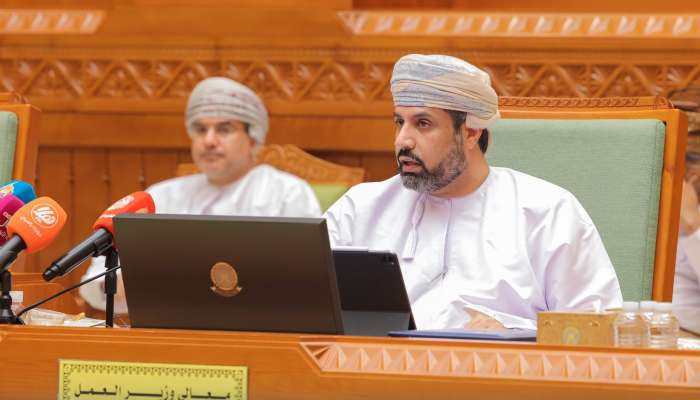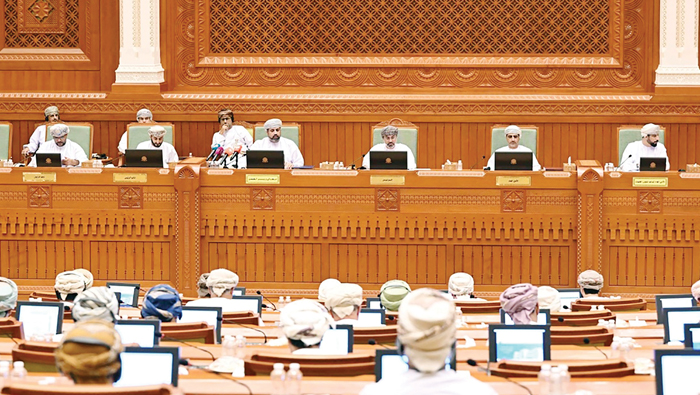

Muscat: More than 86,000 citizens were provided jobs in the public and private sectors over the last two years in the Sultanate Oman, the Minister of Labour, Dr. Mahad bin Saeed Ba’awin, said during a review meeting before the Shura Council on Monday.
“Providing jobs is a top priority and the Ministry, in cooperation with strategic partners, created job opportunities for 86,530 male and female citizens in both public and private sectors from January 2021 to December 2022,” the Minister of Labour added.
The Shura Council yesterday discussed the statement of Dr. Mahad Said Ba’owain, Minister of Labour, during the 7th regular session of the 4th annual sitting (2022-2023) of the 9th term (2019-2023), held under the chairmanship of Khalid bin Hilal Al-Ma’awali, Chairman of the Council.
The statement included four main themes covering several basic aspects, namely the ministry’s policies, plans and programmes during the first executive plan (the 10th five-year plan 2021-2025) of Oman Vision 2040, the legislation and laws regulating work in the public and private sectors, employment in the two sectors, and training and qualification.
The Minister of Labour’s statement issued by the Ministry of Labour indicated that the Ministry has made constant efforts in implementing strategic approaches to develop labour market policies, provide facilities and lend support for the private sector, and channel efforts towards launching many job initiatives to provide suitable job opportunities for jobseekers.
Nationalising jobs
The statement mentioned that the ministry has worked on developing several strategic programmes, that include finding a new mechanism for nationalising jobs, formulating the national employment policy, as well as a sectoral strategy for developing human resources, whose outputs will contribute to providing job opportunities, training and coaching the Omani workforce in a manner that contributes to labourers’ enrolment and stability in the labour market.
During the statement, the Minister of Labour reviewed the Ministry’s efforts through the services it provides, which cover all governorates of the Sultanate of Oman. These services, the minister added, are rendered by 2,936 male and female employees, to serve a wide range of beneficiaries, including the units of the State’s Administrative Apparatus and its employees.
He indicated that the Ministry provides 91 different services, including 53 electronic services at a rate of 58%, 17 semi-electronic services at a rate of 19%) and 21 non-electronic services at a rate of 23%.
The minister added that the total number of beneficiaries stands at 2,022,741 including 1,891,240 beneficiaries were served electronically, and 131,501 beneficiaries who attended directly to the ministry’s during 2022.
As for the employment sector, the Minister of Labour confirmed that about 86,530 male and female citizens were employed in the public and private sectors during the period from January 2021 to December 2022.
The number of those authorised to be recruited from the non-Omani workforce during the period (2020-2022) reached 902,379 work permits in the commercial category, estimated annually at 300,793. As many as 254,053 work permits were issued for the private business category during the same period, with an annual average of 84,684, bringing the total number of permits to 1,156,432 commercial and private work permits.
The number of active establishments benefiting from the ministry’s services reached 195,544 employing 283,982 insured manpower, and 1,458,498 non-Omani manpower. The total workforce in the private sector until the end of 2022 stood at 1,783,512 male and female workers. The number of domestic workers and their equivalents reached 325,014 male and female workers.
The number of manpower violating provisions of the Labour Law stood at 12,503. The comprehensive inspection campaigns covered 3,406 establishments, in addition to the execution of 2,136 inspection visits to ensure the implementation of the Occupational Safety and Health Regulations for private sector establishments.
On the legislative side, the minister pointed out that the ministry has worked to update the regulatory decisions in this regard, including the issuance of a service guide for commercial licenses (establishments), and a service guide for private licenses (individuals). The application of the two mentioned guides contributed in developing the controls and conditions for granting work licenses and thus achieving the principle of decentralization.
During the session, a number of decisions related to the labour sector at this stage were discussed. The discussions covered the decision on downgrading financial grades for employment in the public sector according to academic qualifications, and issuing the circular on de-linking educational degrees to wages.
The discussions also touched on the decision to mandate workers in the public and private sectors to pay part of their wages to contribute to financing the Job Security Fund.
The Council’s members raised discussions concentrating on the decision to work as per temporary contracts in permanent jobs, in addition to the decision to place employees in specialised and support function jobs and excluding them from promotions, the decision of terminating the services of those who have completed thirty years of service.
It is worth noting that the Shura Council will discuss on Tuesday the draft labour law, based on the report of the Youth and Human Resources Committee, which examined the draft.
With ONA inputs